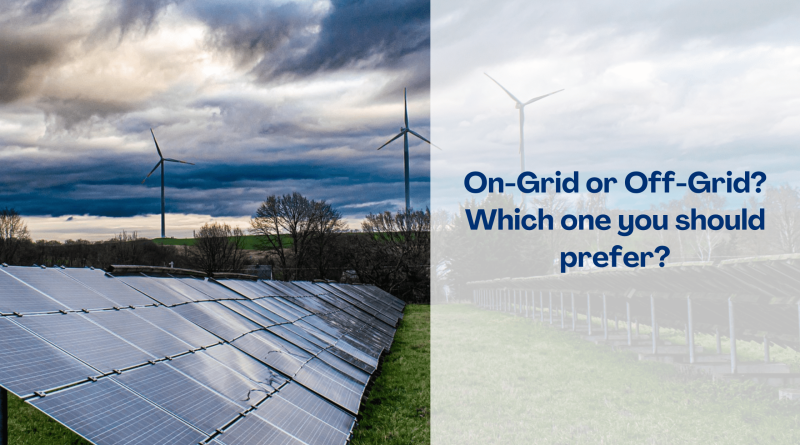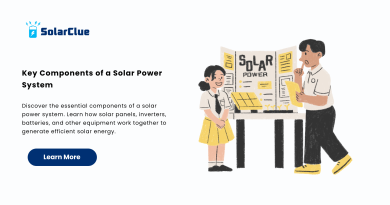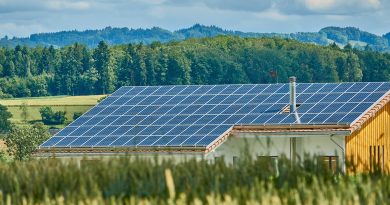Choosing Energy Solutions: On-Grid vs. Off-Grid
Are you looking to set up a solar power system but don’t know which one you should go for? Then you’re in the right place. In this blog, I will give complete information about how to choose your solar power system as per your requirements. Firstly, you need to understand your Electricity Consumption. You are supposed to calculate the units you are consuming. When it comes to choosing between an on-grid or off-grid solar power system, it depends on your specific needs and circumstances. Here’s some information that may help you make a decision:
On-Grid Solar System
An on-grid solar system is connected to the utility grid. During the day, when your solar panels generate electricity, you use it to power your home. Any excess electricity is sent back to the grid, and you may receive credits or compensation for it through net metering or feed-in tariffs. At night or during times when your energy demand exceeds what the solar panels produce, you draw electricity from the grid.
Benefits:
- Lower upfront (initial) costs compared to off-grid systems.
- The ability to take advantage of net metering to offset your electricity bills.
- No need for battery storage as the grid acts as your backup power source during cloudy days or at night.
- Simplified maintenance and fewer equipment requirements.
Considerations:
- Dependency on the utility grid, meaning power outages will affect your solar system’s operation.
- You won’t have electricity during grid failures unless you have a backup power source like a generator.
Off-Grid Solar System
An off-grid solar system is independent of the utility grid. It includes solar panels, a battery bank for energy storage, and an inverter to convert DC power from the panels into AC power for your home. The battery bank stores excess electricity generated during the day, which you can use at night or during periods of low solar energy production.
Benefits:
- Complete energy independence, making it suitable for remote areas or locations without access to the utility grid.
- Unaffected by power outages or grid failures.
- You have control over your energy production and consumption.
- Offers the opportunity for a self-sufficient and sustainable lifestyle.
Considerations:
- Higher upfront costs due to the need for batteries and additional equipment.
- Proper sizing of the system is crucial to ensuring you have enough energy storage to meet your needs.
- Regular maintenance and monitoring of battery health are required.
Conclusion
The choice between living on-grid or off-grid depends on your personal preferences and lifestyle. Living on a grid means being connected to public utilities such as electricity, water, and sewage systems. This option offers convenience and reliable access to basic services. On the other hand, living off the grid means being self-sufficient and not relying on public utilities. This option can provide more independence and sustainability, but it requires careful planning and investment in alternative energy sources and water management systems. Ultimately, the decision should consider factors like location, cost, environmental impact, and your willingness to live with certain limitations and responsibilities.
On-Grid systems are connected to the utility grid, while Off-Grid systems operate independently, without grid connections.
On-Grid systems are generally more cost-effective upfront, while Off-Grid systems provide independence but may have higher initial costs.
On-Grid systems shut down during outages to prevent backfeeding electricity into the grid, ensuring safety for utility workers.
Yes, Off-Grid systems use batteries to store excess energy for use during periods without sunlight or when the grid is unavailable.
On-Grid systems may rely on conventional power sources, while Off-Grid systems use clean energy, reducing environmental impact.
While possible, it may involve significant modifications and costs. It’s advisable to plan for the desired system from the start.
Incentives vary, but many governments offer rebates, tax credits, or grants to promote renewable energy adoption.
Both systems have a similar lifespan, typically around 25-30 years, with proper maintenance and component replacements.
It’s possible to have a hybrid system that combines aspects of both, providing flexibility and energy security.
Consider factors like location, energy requirements, budget, and desired level of independence when choosing between On-Grid and Off-Grid systems.



